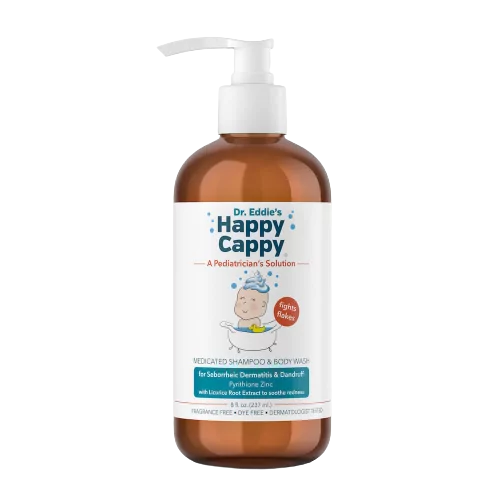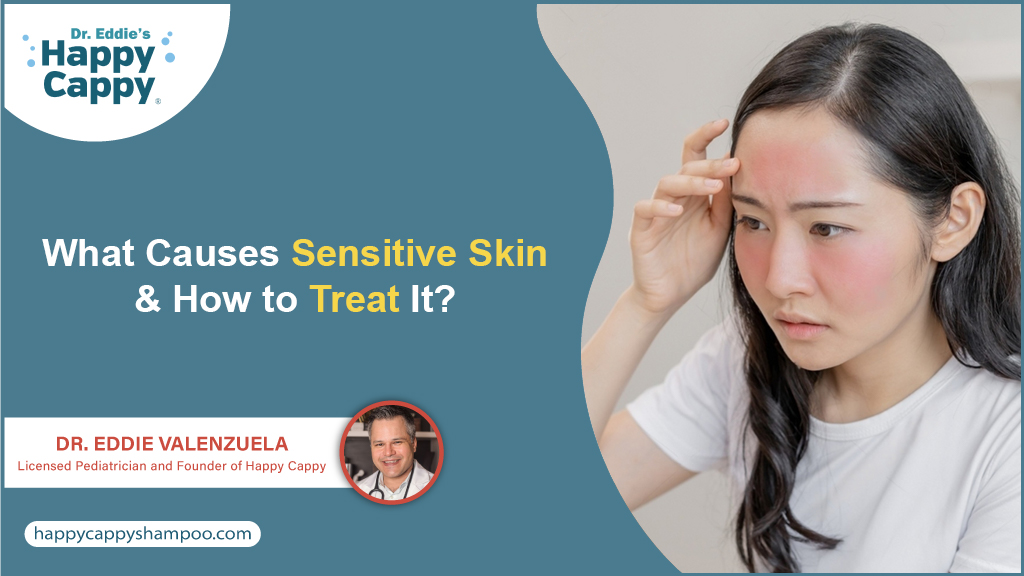
We all have that friend whose mood can turn on a dime. You feel like you are constantly walking on eggshells, worried that with one wrong thing uttered, and it may send them into a ten-minute rant about something you wish you didn’t have to pay attention to.
If you have sensitive skin, that friend is your roommate, and you wear them all over your body.
What is Sensitive Skin?
Sensitive skin is when everything affects it more than usual. You may be more prone to sunburn. You may react negatively to soaps, shampoos, and skincare products that other people can easily tolerate.
It is not a disease that your doctor can diagnose but a skin condition that is usually developed as a symptom of another condition. It is known for causing itching, burning, and stinging sensation.
This term was first described in the 1970s to classify skin that is more reactive towards common things and is more prone to irritation. The good news about this condition is that it can be managed by avoiding the triggers and soothing the skin.
Want to know how to do that? Stick with us, and you will soon know everything important about sensitive skin.
How to Know if You Have Sensitive Skin?
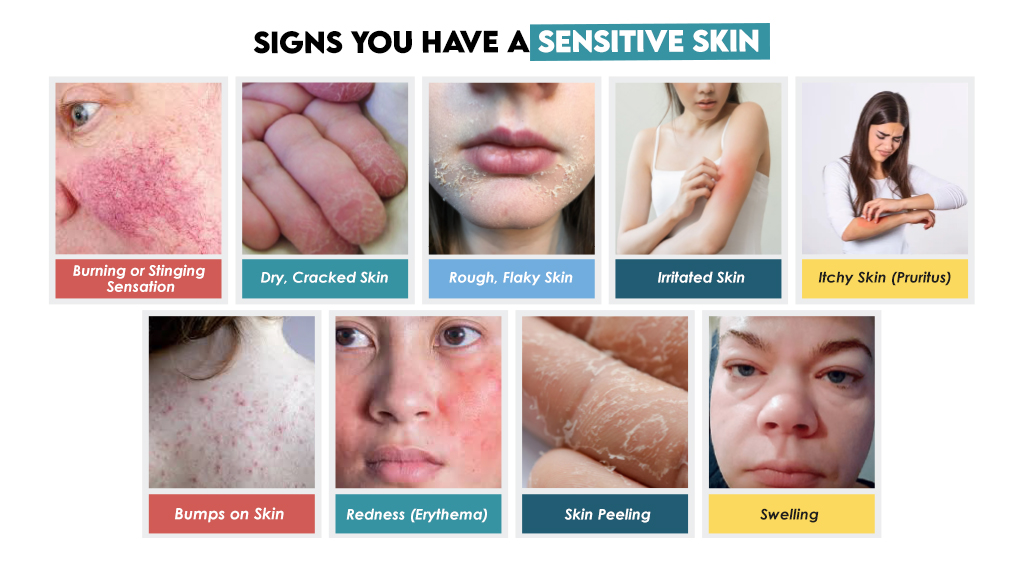
Sensitive skin is itself a skin type; it is simply when your skin overacts towards certain things that normal skin types won’t react to, such as dust, sunlight, and smoke. But if you are wondering how to know if you have it or not. We have listed a few signs and symptoms to help you identify them.
It can cause the following symptoms to appear on your skin.
- Burning or stinging sensation
- Dry, cracked skin
- Rough, flaky skin
- Irritated skin
- Itchy skin (Pruritus)
- Bumps on skin
- Redness (Erythema)
- Skin peeling
- Swelling
This condition can cause both subjective and objective symptoms. Objective symptoms are those that you can physically see, like redness (doctors call these “signs”) and subjective symptoms are those that you feel, like skin burning.
The following signs can help you determine if you have hypersensitive skin. You may experience one sign most of the time or all of them together.
- Your skin is more reactive to chemicals in soap, detergent, and household and skincare products.
- You experience red rashes, flushing, and blushing often.
- Your skin becomes excessively dry.
- You often develop acne, small bumps, blisters, and breakouts.
- Your skin becomes irritated easily with sunlight.
Even though this skin issue can be diagnosed at home, if you are still unsure about anything or the symptoms are very severe, it is best to consult your healthcare provider or dermatologist for evaluation and treatment.
Why is my Skin so Sensitive?
Many factors and triggers can lead to skin sensitivity. These causes can be divided into two categories: common causes, which are just some natural things and processes that our body goes through, and skin conditions that may develop sensitive skin as a symptom.
Common Causes
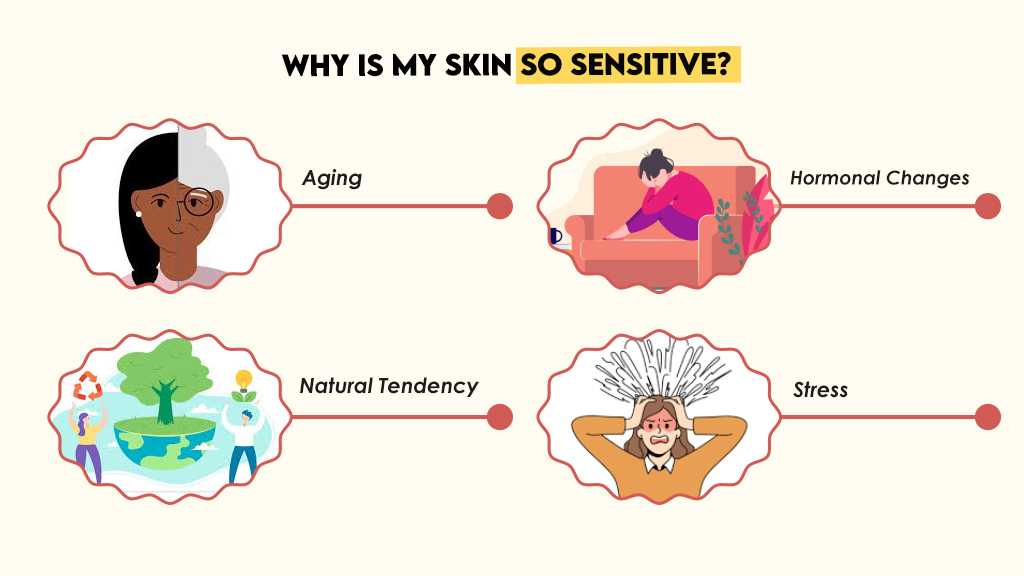
Aging
As we age, our skin becomes more vulnerable to dryness and starts losing more moisture, making it difficult for the epidermis to protect the skin against outside irritants, resulting in sensitivity.
Natural Tendency
Sometimes, sensitive skin is just your skin acting normally. Some people are born with it. Even the most common things, like cold temperatures, sunlight, and even heavy winds, can trigger a reaction on their skin.
Hormonal Changes
Hormonal changes can not only trigger acne vulgaris but can cause many other changes in your body as well. Getting sensitive skin is one of them. People often notice that skin becomes more sensitive right before menstruation or during pregnancy.
Stress
Stress can also trigger sensitivity. When you are under constant stress, your skin cells are unable to provide enough moisture to the skin which makes it prone to dry, irritated sensitive skin.
Skin Conditions That Cause Skin Sensitivity
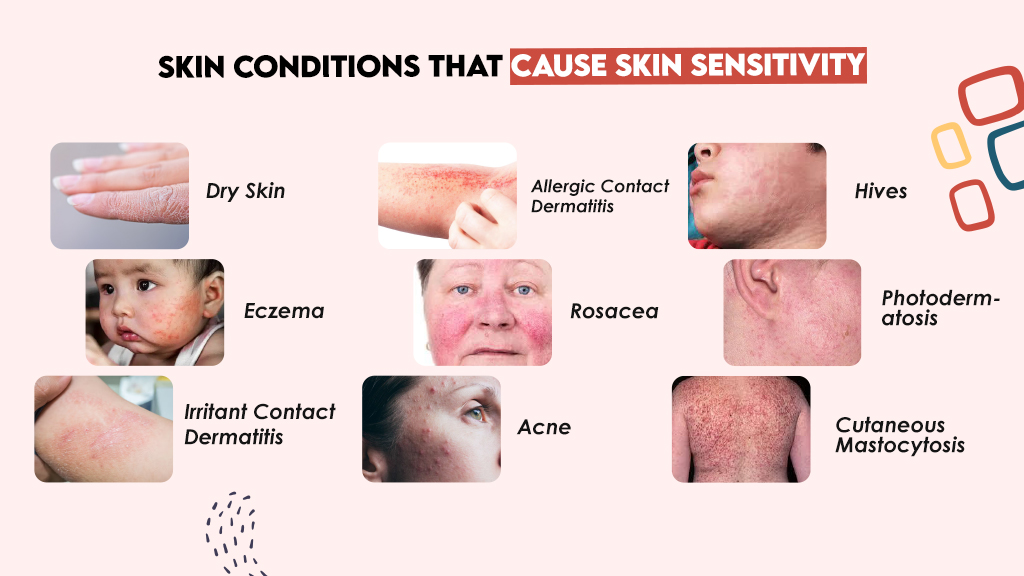
Sensitive skin is usually a symptom of some underlying condition, and while not serious, these disorders can set your skin on edge. They include:
Dry Skin
If you have dry skin or suffer from a dry skin condition, you are more likely to experience skin sensitivity. The lack of moisture and sebum on the skin reduces its ability to protect itself against outside irritants and bacteria.
This is why, suddenly, the face wash you have been using for a long time may start causing itching, irritation, and rashes. If this happens, then switch to a gentle face wash for sensitive skin.
Eczema
Eczema, also known as Atopic dermatitis, is a common chronic inflammatory skin condition that causes redness, irritation, and dry, itchy skin. This is due to a dysfunctional skin barrier that causes the skin to lose more moisture more easily.
Eczema is more common in children under the age of 5, but anyone can experience it at any age. It usually affects the face, elbows, knees, hands, and feet, mostly the exposed areas.
If you or your child is experiencing an eczema flare-up, you can soothe their symptoms by cleaning the skin with an eczema shampoo and body wash and moisturizing it regularly with an eczema cream.
Irritant Contact Dermatitis
Irritant contact dermatitis is a type of eczema. This appears when your skin is irritated by coming in contact with a certain irritant. Some of the most common ones are:
- Soap
- Detergents
- Chemicals in skin products
- Fragrances
- Dust
- Smoke
- Extreme weather
- UV rays
When any irritant comes in contact with your skin, your immune system becomes active and reacts with redness, rashes, and irritation to protect your skin. You can manage this condition by staying away from the culprit.
Allergic Contact Dermatitis
It is a type of contact dermatitis in which your immune system causes an allergic reaction when your skin comes in contact with an allergen. Some of the most common allergens around us are:
- Poison ivy
- Poison oak
- Nickel or metals
- Clothing
- Antibiotics
- Rubber or latex
It can cause skin inflammation, redness, blisters, and rashes. To treat this condition, the dermatologist will advise you to avoid the allergen as much as possible and prescribe you certain medications, such as antihistamines, injectable biologics, or topical steroids, depending on your symptoms.
Rosacea
Rosacea is an inflammatory skin condition that can cause flushing, redness, and visible blood vessels. It usually appears on the face, cheeks, and nose. It can cause flare-ups from time to time.
The most common triggers for rosacea flare-ups are sunrays and stress. It is usually treated with the help of prescription medications, self-care, or laser treatment for severe cases.
Acne
Teenagers often experience acne during puberty and women experience it due to hormonal changes in the body. It is the most common skin problem, affecting more than half of the population worldwide.
Other factors can also lead to acne and breakouts. It can cause skin inflammation and make it more sensitive to almost anything, especially the products that you directly apply to your skin.
When choosing acne products, make sure to examine their ingredients closely and ensure that they are safe for sensitive skin.
Hives
Hives are medically known as physical urticaria. They usually appear when your skin is exposed to a certain factor, such as heat or food. These usually appear as red rashes that may cause swelling and itchy skin.
The rashes can make your skin more sensitive. The symptoms of urticaria usually disappear after 24 or 48 hours. However, if you notice that the rash is not getting better, then consult a doctor.
Photodermatosis
This is a skin condition when your skin reacts to the sun’s UV rays. For people who have this condition, their immune system triggers a reaction as soon as they come in contact with the rays.
The reaction mostly appears as a red rash, blisters, and scaly patches on the skin. It mostly appears on body parts that are directly exposed to sunlight. The more time you spend in the sun, the worse the symptoms will get.
Polymorphic light eruption, or PLE, is the most common type. The symptoms can be prevented by covering your skin and using sunscreen when going outside, even on cloudy days.
Cutaneous Mastocytosis
This is a rare skin issue that is more common in children than in adults. In it, immune cells accumulate in the skin and release histamines when the skin comes in contact with an irritating substance.
This condition can lead to redness, itching, skin lesions, and sensitivity. A dermatologist may prescribe antihistamines and topical corticosteroid creams to treat it.
Dry Skin VS Sensitive Skin
Dry skin or xerosis is often confused with sensitive skin because they often coexist. They may cause similar symptoms, making it difficult to distinguish them. However, both are different, and in severe cases, they may need different treatment.
A lack of moisture causes dry skin, while sensitivity appears as the skin’s reaction to a certain irritant or allergen. Both the issues can also appear as a symptom of the other condition. For example, if you are experiencing dry skin, you may develop redness, irritated skin and sensitized skin as a result.
Dry skin can be managed by keeping it moisturized. In contrast, sensitive skin requires following a gentle daily skincare routine and avoiding the trigger to reduce chances of having the condition.
Sensitive Skin Treatment
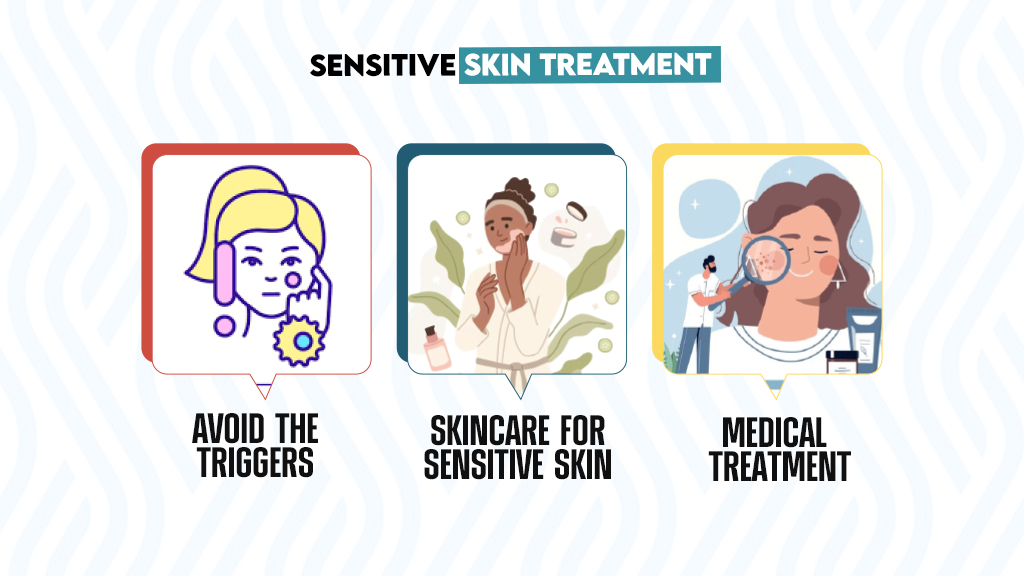
You should know that getting fed up with your high-maintenance skin and storming out won’t help because it’s going to follow you everywhere you go. Instead of listening to its constant complaining — “That soap makes me itchy!”, “Can we burn that sweater?”, “Are you really going to smear THAT on me again?”
The best way to soothe it is by learning your triggers and avoiding them. Pay attention to what you are doing when you have an outbreak and look for patterns.
Avoid the Triggers
You can not treat sensitive skin unless you avoid the particular trigger that is causing your condition. You can do this by paying close attention to your skin and noticing when you experience a flare-up.
Do I break out when using that acne face wash or when I go on a camping trip in the forest? If you are unable to rule out your trigger, then consult a doctor. They can help you identify it by performing a few tests on your skin.
Skincare for Sensitive Skin
The next important step in soothing the condition is taking care of your skin. People who have sensitive, dry skin need to follow a proper skincare routine that includes.
Cleansing
It is essential to keep your skin clean so that the bacteria and viruses present on it do not worsen the condition.
- Make sure that you take a bath daily.
- Use a gentle, fragrance-free cleanser for sensitive skin.
- To wash your skin, use lukewarm or cool water.
- Do not vigorously scrub your skin.
- Use a gentle exfoliator to exfoliate your skin once a week.
Moisturizing
The second most important step that should be incorporated into your skincare routine is moisturizing.
- Use a fragrance-free, hypoallergenic moisturizer for sensitive skin to keep your skin moisturized.
- Use it at least twice daily, once in the morning and once at night.
- Moisturize the skin every time after washing it.
Medical Treatment
For severe cases of sensitive skin or if a certain skin condition is causing it, a dermatologist may prescribe medication to treat the underlying cause and improve the condition.
This may include the use of
- Antihistamines: these are oral medications that relieve the symptoms by blocking the reactor cells.
- Steroid creams: Creams such as hydrocortisone or triamcinolone can help relieve itching and irritation.
- Analgesic creams: these are numbing creams that help soothe itching.
Best Moisturizer for Sensitive Skin
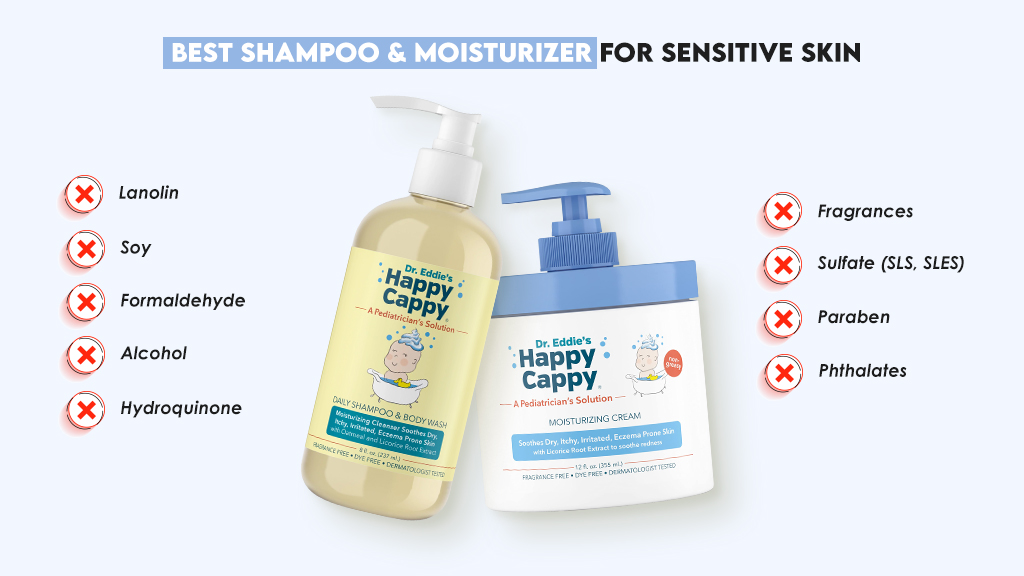
Sensitive skin is often aggravated by harsh chemicals in the skin products such as
- Fragrances
- Dyes
- Phthalates
- Parabens
- Salicylic acid
- Retinoids
- Sulfates
- Isopropyl alcohol
- Lanolin
- Latex
Before using a product on your skin, scan the ingredient list carefully and avoid anything that contains any of the triggering components mentioned above. Instead, go for a cleanser and moisturizer that contains any of these skin-soothing natural ingredients such as
If you are in search of a non-greasy, fast-absorbing moisturizing cream for sensitive skin, try Happy Cappy Moisturizing Cream. It is specially formulated by Dr. Eddie and contains licorice root extract and glycerin to hydrate the skin all day long.
For extra hydration and soothing of the skin, first clean your skin with Happy Cappy Daily Shampoo and Body Wash a hypoallergenic cleanser which contains oatmeal extracts, aloe vera, and hyaluronic acid that helps clean and moisturize your skin at the same time.
These Happy Cappy products are safe to be used by babies, teenagers, children, and adults with sensitive skin.
Do’s and Don’ts of Sensitive Skin Type
| Do’s | Don’ts |
| Carefully read the labels of products before using them. | Use any products, whether for your skin or for cleaning your house, that contain harsh chemicals. |
| Limit your shower time for around 5 to 10 minutes. | Go for long hot baths and showers |
| Patch test a product before using it. | Use chemical exfoliators or any harsh material to scrub your skin. |
| Use products that are free from irritating chemicals and contain natural ingredients. | Use any products that contain fragrances, especially soap, shampoo, and body wash. |
| Use any makeup that is labeled as non-comedogenic | Clog your skin pores with expired or heavy makeup. |
| Choose lightweight, breathable material for your clothing. | Use harsh materials and fabrics such as wool for clothing or bedding. |
| Wash your clothes and bedding often to avoid bacteria and viruses. | Use detergents and fabric softeners with fragrances. |
| Keep your skin moisturized as much as possible. | Don’t stress, it can trigger or worsen the condition. |
When to Consult a Dermatologist?
Sometimes, it can be very difficult to pinpoint the irritant that may be triggering or worsening your condition, especially if it’s something other than your skincare products. In this case, it is advisable to consult a dermatologist.
They may prescribe certain tests, such as patch tests and skin biopsy, and help you identify your trigger so that you can avoid it and soothe your condition.
Sensitive skin is usually not a serious condition, but if you experience any of the following or a severe allergic reaction, consult a doctor. They may prescribe oral medications and topical steroids to improve the condition.
- Difficulty in breathing
- Swelling in the throat, face, or tongue
- Severe painful rashes all over your body
- Bumps and blisters that are oozing fluids or blood.
- Dizziness and fatigue
- Any sign of skin infection.
Consulting a doctor will not only help you accurately diagnose your condition but also get you the right treatment plan.
Conclusion
Sensitive skin is usually just your skin reacting to a certain irritant or allergen. It can be caused by natural factors such as genetics and hormonal changes in the body or as a symptom of an underlying skin condition like eczema, hives, and photodermatosis.
The reality is that if you have sensitive skin, you’ll likely have to contend with it for life. But that doesn’t mean it has to slow you down. Learning your triggers, avoiding them, and keeping your skin protected can help you soothe the condition.
Try the Happy Cappy family of products. We formulate them to accommodate even the most sensitive skin. So befriend your skin again. After all, you have no choice but to spend time with it.
FAQs
What are the common signs of sensitive skin?
Some common symptoms and signs that you may notice on your skin or feel if you have sensitive skin are:
Redness
Inflammation
Itchy skin
Skin irritation
Dry, rough skin
Rashes
The severity and appearance of symptoms may vary depending on the root cause of your condition.
Is sensitive skin oily or dry?
Sensitive skin can be oily or dry. It occurs when the skin reacts to a certain irritant or allergen. Whether you have dry, oily, or normal skin, it doesn't really matter.
Which moisturizer is good for sensitive skin?
A good moisturizer for sensitive skin is one that is free from any harsh or skin-irritating chemicals such as fragrances, sulfate, paraben, lanolin, and phthalates. It is best if it contains soothing natural ingredients that can help soothe symptoms like itching and irritation.
How to apply moisturizer to sensitive skin?
When applying a moisturizer to sensitive skin, don’t rub, pull, or scrub your face. Apply it in smooth circular motions. Choose a non-greasy and fast-absorbing moisturizing cream, as it is easier to apply.







